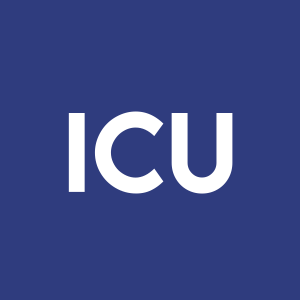Economic Analysis Supporting Significant Hospitalization Cost Reduction with SeaStar Medical’s QUELIMMUNE Pediatric Therapeutic Device Presented at ASN Kidney Week 2024
Rhea-AI Summary
SeaStar Medical presented economic analysis data for its QUELIMMUNE device at ASN Kidney Week 2024, demonstrating significant cost-saving potential in treating pediatric acute kidney injury (AKI). The analysis revealed that hospitalization costs for pediatric AKI patients requiring CRRT averaged $461,736, while treatment with QUELIMMUNE could save approximately $30,000 per hospitalization. The device achieves cost neutrality after 6 days of therapy and shows a 77% survival rate in children ≥10 kg, compared to 50% with standard care. The company also presented data on ongoing trials including NEUTRALIZE-AKI and NEUTRALIZE-CRS, highlighting their expanding therapeutic applications.
Positive
- QUELIMMUNE demonstrates $30,000 cost savings per hospitalization
- 77% survival rate in children ≥10 kg versus 50% with standard care
- 0% dialysis dependence at day 60 in clinical studies
- Cost neutrality achieved after 6 days of therapy
Negative
- None.
News Market Reaction – ICU
On the day this news was published, ICU declined 2.19%, reflecting a moderate negative market reaction.
Data tracked by StockTitan Argus on the day of publication.
Data illustrate the potential of QUELIMMUNE™️ with cost neutrality starting at 6 days of therapy and a significant reduction in total hospitalization costs in children with acute kidney injury
SeaStar Medical’s SCD was featured in four Company presentations
at the premier nephrology conference
DENVER, Oct. 25, 2024 (GLOBE NEWSWIRE) -- SeaStar Medical Holding Corporation (Nasdaq: ICU), a commercial-stage medical device company developing proprietary solutions to reduce the consequences of hyperinflammation on vital organs, announces that for the first time new data highlighting the cost savings of its first-in-class, cell-directed Selective Cytopheretic Device (SCD) Pediatric therapeutic device, QUELIMMUNE, were presented yesterday at the American Society of Nephrology’s (ASN) Kidney Week 2024, underway in San Diego.
“We are thrilled to present a high-quality analysis highlighting the significant potential cost-saving benefits of QUELIMMUNE to the healthcare system in treating critically ill children with acute kidney injury (AKI) at this renowned nephrology conference," said Eric Schlorff, CEO of SeaStar Medical. “QUELIMMUNE is another tool in the arsenal for hospitals to defeat pediatric AKI with sepsis. Sepsis is a big challenge, which is why the Centers for Medicare & Medicaid Services (CMS) developed the SEP-1 protocol and quality metric for hospital systems to perform against.
“Importantly, our findings underscore the opportunity for widespread adoption by hospitals to generate significant cost while also saving lives,” he added. “Utilization of QUELIMMUNE is also operationally efficient. It fits directly into existing continual renal replacement therapy (CRRT) circuits.”
The poster, titled Cost Impact of An Immunomodulatory Selective Cytopheretic Device in Pediatrics (SCD-PED) in AKI due to Sepsis (AKI-S), presents an analysis of the Kids’ Inpatient Database (KID) revealing that the hospitalization cost of pediatric patients with AKI requiring CRRT, a majority of whom were septic, was
Additional benefits of QUELIMMUNE included a cost-effective solution for institutions starting at 6 days of QUELIMMUNE therapy, which produced cost neutrality for QUELIMMUNE afforded by the high survival rate of
The SeaStar Medical team has a significant presence at Kidney Week 2024, with a total of four posters being presented by the Company. A second poster describes the mechanistic effects of reducing hyperinflammatory markers in patients with AKI. Additional SeaStar Medical posters that highlight the design of the ongoing NEUTRALIZE-AKI pivotal trial and the upcoming NEUTRALIZE-CRS trial are summarized below:
- NEUTRALIZE-AKI: A Multicenter, Randomized, Controlled Pivotal Study to Assess the Safety and Efficacy of a Selective Cytopheretic Device in Patients with AKI Requiring Continuous Kidney Replacement Therapy (L. Yessayan, et al.) The ongoing NEUTRALIZE-AKI trial aims to evaluate the safety and efficacy of the SCD in adults with AKI requiring CKRT.
- NEUTRALIZE-CRS: A Multicenter, Single-Arm, Open-Label Study to Assess a Selective Cytopheretic Device in Bridging Severe Heart Failure Patients to Left Ventricular Assist Device (LVAD) Implantation (L. Yessayan, et al.). This study is designed to evaluate SCD treatment in cardiorenal syndrome (CRS) patients and its effectiveness in bridging them to LVAD. The study aims to enroll 20 ICU patients with acute or chronic systolic heart failure and worsening renal function due to CRS who are awaiting LVAD implantation. Key outcomes include safety of the SCD, reversal of cardiac and renal dysfunction and the number of patients successfully transitioned to LVAD.
ASN Kidney Week
ASN Kidney Week is the world’s premier nephrology meeting with more than 12,000 kidney professionals from across the globe expected to attend the 2024 event. ASN Kidney Week provides participants exciting and challenging opportunities to exchange knowledge, learn the latest scientific and medical advances, and listen to engaging and provocative discussions with leading experts in the field.
Acute Kidney Injury (AKI) and Hyperinflammation
AKI is characterized by a sudden and temporary loss of kidney function and can be caused by a variety of conditions such as COVID-19, sepsis, severe trauma and surgery. AKI can cause hyperinflammation, which is the overproduction or overactivity of inflammatory effector cells and other molecules that can be toxic. Damage resulting from hyperinflammation in AKI can progress to other organs, such as the heart or liver, and potentially to multi-organ dysfunction or even failure that could result in worse outcomes, including increased risk of death. Even after resolution, these patients may face chronic kidney disease or end-stage renal disease requiring dialysis, among other complications. Hyperinflammation may also contribute to added healthcare costs, such as prolonged ICU stays and increased reliance on dialysis and mechanical ventilation.
Selective Cytopheretic Device
The Selective Cytopheretic Device (SCD) is a patented cell-directed extracorporeal device that employs immunomodulating technology to selectively target proinflammatory neutrophils and monocytes during CKRT and reduces the hyperinflammatory milieu including the cytokine storm. Unlike pathogen removal and other blood-purification tools, the SCD is integrated with CKRT hemofiltration systems to selectively target and transition proinflammatory monocytes to a reparative state and promote activated neutrophils to be less inflammatory. This unique immunomodulation approach may promote long-term organ recovery and eliminate the need for future KRT, including dialysis.
The SCD has been awarded U.S. Food and Drug Administration (FDA) Breakthrough Therapy Designation in three indications:
- Cardiorenal Syndrome – Left Ventricular Assist Device (CRS-LVAD)
- Adult Acute Kidney Injury (AKI)
- Hepatorenal Syndrome (HRS)
QUELIMMUNE, the SCD-Pediatric device, is being commercialized following FDA approval for children with AKI and sepsis or septic condition weighing 10 kilograms or more who are being treated in the ICU with KRT. QUELIMMUNE was approved in February 2024 under a Humanitarian Device Exemption (HDE) application, having met the applicable criteria with clinical results showing safety and probable clinical benefit in a limited population of critically ill children with AKI who have few treatment options.
About SeaStar Medical
SeaStar Medical is a commercial-stage medical technology company that is redefining how extracorporeal therapies may reduce the consequences of excessive inflammation on vital organs. SeaStar Medical’s novel technologies rely on science and innovation to provide life-saving solutions to critically ill patients. The Company is developing and commercializing cell-directed extracorporeal therapies that target the effector cells that drive systemic inflammation, causing direct tissue damage and secreting a range of pro-inflammatory cytokines that initiate and propagate imbalanced immune responses. For more information visit www.seastarmedical.com or visit us on LinkedIn or X.
Forward-Looking Statements
This press release contains certain forward-looking statements within the meaning of the “safe harbor” provisions of the Private Securities Litigation Reform Act of 1955. These forward-looking statements include, without limitation, the amount and timing of future QUELIMMUNE commercial sales; the ability of SeaStar Medical to meet the demand for and the revenue recognition on QUELIMMUNE commercial sales; commercial acceptance of QUELIMMUNE; the ability of SCD to treat patients with AKI and other diseases; the expected regulatory approval process and timeline for commercialization; and the ability of SeaStar Medical to meet the expected timeline. Words such as “believe,” “project,” “expect,” “anticipate,” “estimate,” “intend,” “strategy,” “future,” “opportunity,” “plan,” “may,” “should,” “will,” “would,” “will be,” “will continue,” “will likely result,” and similar expressions are intended to identify such forward-looking statements. Forward-looking statements are predictions, projections and other statements about future events that are based on current expectations and assumptions and, as a result, are subject to significant risks and uncertainties that could cause the actual results to differ materially from the expected results. Most of these factors are outside SeaStar Medical’s control and are difficult to predict. Factors that may cause actual future events to differ materially from the expected results include, but are not limited to: (i) the risk that SeaStar Medical may not be able to obtain regulatory approval of its SCD product candidates; (ii) the risk that SeaStar Medical may not be able to raise sufficient capital to fund its operations, including current or future clinical trials; (iii) the risk that SeaStar Medical and its current and future collaborators are unable to successfully develop and commercialize its products or services, or experience significant delays in doing so, including failure to achieve approval of its products by applicable federal and state regulators, (iv) the risk that SeaStar Medical may never achieve or sustain profitability; (v) the risk that SeaStar Medical may not be able to access funding under existing agreements; (vi) the risk that third-parties suppliers and manufacturers are not able to fully and timely meet their obligations, (vii) the risk of product liability or regulatory lawsuits or proceedings relating to SeaStar Medical’s products and services, (viii) the risk that SeaStar Medical is unable to secure or protect its intellectual property, and (ix) other risks and uncertainties indicated from time to time in SeaStar Medical’s Annual Report on Form 10-K, including those under the “Risk Factors” section therein and in SeaStar Medical’s other filings with the SEC. The foregoing list of factors is not exhaustive. Forward-looking statements speak only as of the date they are made. Readers are cautioned not to put undue reliance on forward-looking statements, and SeaStar Medical assumes no obligation and does not intend to update or revise these forward-looking statements, whether as a result of new information, future events, or otherwise.
Contact:
Alliance Advisors IR
Jody Cain
(310) 691-7100
Jcain@allianceadvisors.com
# # #








